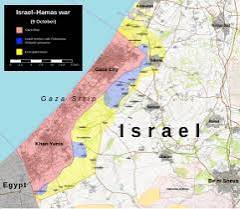**The Israel-Hamas Conflict and Its Implications for Africa and Ghana**
The ongoing conflict between Israel and Hamas, a militant group governing the Gaza Strip, continues to be a significant source of global concern. The conflict, marked by periodic escalations of violence and deep-seated political and territorial disputes, has far-reaching implications that extend beyond the Middle East. For Africa, and specifically Ghana, understanding these implications is crucial as they navigate the potential impacts on their own geopolitical and economic landscapes.
**Economic Impact**
One of the most immediate ways in which the Israel-Hamas conflict affects Africa is through economic channels, particularly via the global oil market. The Middle East is a major oil-producing region, and conflicts in this area can lead to fluctuations in oil prices. For countries like Ghana, which is an emerging economy with a growing dependence on energy imports, rising oil prices can translate into increased costs for energy and transportation. This can strain Ghana’s economy, affecting everything from inflation rates to the cost of goods and services.
**Trade and Investment**
The instability in the Middle East can also influence global trade patterns and investment flows. Africa, including Ghana, has been increasingly integrated into global supply chains. Disruptions in the Middle East could affect trade routes and investment opportunities. For instance, if regional instability impacts shipping lanes or investment confidence, Ghana could face challenges in maintaining its trade relationships and attracting foreign investment, which are vital for its economic development.
**Political and Diplomatic Relations**
The Israel-Hamas conflict also has diplomatic implications. African nations, including Ghana, often find themselves balancing their foreign policies amidst global pressures and alliances. The conflict can affect diplomatic relations, as countries may face pressure from various international actors to take sides or align with specific narratives. For Ghana, maintaining a balanced approach while navigating international pressures is crucial to its foreign policy and diplomatic standing.
**Humanitarian Concerns**
The humanitarian crisis resulting from the conflict can resonate globally. The images and reports of civilian suffering in Gaza can prompt international responses, including from African nations. Ghana, known for its active role in peacekeeping and humanitarian efforts, may find itself in a position to contribute to humanitarian aid or advocacy efforts. The crisis can also heighten awareness of broader issues related to displacement and refugee flows, which could influence Ghana’s policies on asylum and humanitarian support.
**Security and Extremism**
There is a broader security concern that the conflict could exacerbate extremism or inspire militant movements in other regions, including Africa. The rise of extremist groups and the spread of radical ideologies can have direct implications for African countries, potentially influencing local security dynamics and contributing to instability. Ghana, like other African nations, needs to be vigilant about these developments to ensure its own national security.
**Public Opinion and Social Media**
The conflict’s portrayal in international media and social media can impact public opinion globally. In Ghana, as in other countries, public sentiment and advocacy related to international conflicts can shape domestic discourse and policy preferences. The rise of social media has amplified these voices, making it important for Ghanaian policymakers to navigate both domestic and international public opinion effectively.
In conclusion, while Ghana is geographically distant from the Israel-Hamas conflict, the repercussions of this conflict can be felt through economic pressures, diplomatic challenges, humanitarian concerns, and security risks. As such, it is vital for Ghana to remain informed and responsive to these global dynamics, ensuring that its policies and strategies address both immediate and long-term implications.


